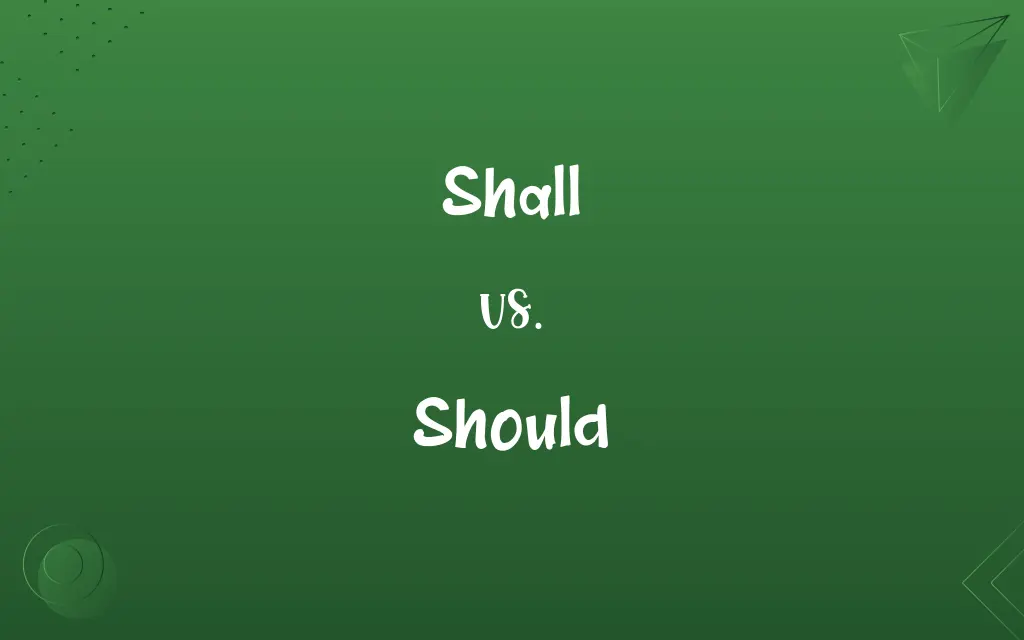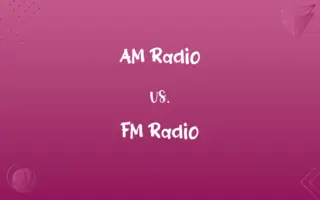Shall vs. Should: Know the Difference

By Shumaila Saeed || Published on February 7, 2024
"Shall" implies a strong intention or a directive, while "should" suggests a recommendation or obligation.

Key Differences
"Shall" is a modal verb often used to indicate a future action, particularly in formal contexts. It implies a certain level of determination or requirement. Conversely, "should" is used to suggest a recommendation, advisability, or obligation, but with a sense of conditionality or potentiality.
Shumaila Saeed
Feb 07, 2024
In legal or formal documents, "shall" is used to express a mandatory action or a provision. It carries a sense of commitment. "Should," on the other hand, is less definitive and is often used to imply what is appropriate or advisable in a given situation.
Shumaila Saeed
Feb 07, 2024
"Shall" can be used to offer or ask for a suggestion, especially in the form of a question, like "Shall we begin?". It's a more formal and less common usage. "Should" is more commonly used in everyday language to give advice or talk about what is right or correct.
Shumaila Saeed
Feb 07, 2024
When expressing future actions, "shall" is typically used with first-person pronouns (I, we) to create a formal tone. In contrast, "should" is used with any subject to suggest a recommended action or condition that is ideal or desired.
Shumaila Saeed
Feb 07, 2024
In terms of obligation, "shall" is often used in a prescriptive manner, indicating what must be done. "Should" is used to express a less forceful obligation, more in the sense of what is desirable or expected rather than mandatory.
Shumaila Saeed
Feb 07, 2024
ADVERTISEMENT
Comparison Chart
Usage Context
Formal, legal, future actions
Advice, recommendation, conditionality
Shumaila Saeed
Feb 07, 2024
Obligation Level
Strong commitment or directive
Advisory or suggested action
Shumaila Saeed
Feb 07, 2024
ADVERTISEMENT
Shall and Should Definitions
Shall
"Shall" is used to express future action or intention.
I shall complete the report by tomorrow.
Shumaila Saeed
Jan 19, 2024
Should
"Should" expresses an obligation or duty.
You should apologize for your mistake.
Shumaila Saeed
Jan 19, 2024
Shall
"Shall" is used for offering suggestions or making offers.
Shall we go to the cinema tonight?
Shumaila Saeed
Jan 19, 2024
Should
Used to express the ideal or desirable.
One should always be honest in their dealings.
Shumaila Saeed
Jan 19, 2024
Shall
In legal context, "shall" indicates a mandatory provision.
The tenant shall pay the rent on the first day of each month.
Shumaila Saeed
Jan 19, 2024
ADVERTISEMENT
Should
(auxiliary) Ought to; indicating opinion, advice, or instruction, about what is required or desirable.
Shumaila Saeed
Jan 17, 2024
Shall
"Shall" expresses a strong degree of certainty.
We shall overcome these challenges.
Shumaila Saeed
Jan 19, 2024
Should
Used to issue an instruction (traditionally seen as carrying less force of authority than alternatives such as 'shall' or 'must').
You should never drink and drive.
The law is clear that you should always wear a seat belt.
The manual says that this switch should be in the 'off' position.
Shumaila Saeed
Jan 17, 2024
Shall
"Shall" is used in formal requests or questions.
Shall I open the window?
Shumaila Saeed
Jan 19, 2024
Should
Used to give advice or opinion that an action is, or would have been, beneficial or desirable.
You should go and see that film. I think you'll enjoy it.
I should exercise more often, but I’m too lazy.
She should not have been so rude.
Shumaila Saeed
Jan 17, 2024
Shall
Used before a verb to indicate the simple future tense in the first person singular or plural.
I shall sing in the choir tomorrow.
I hope that we shall win the game.
Shumaila Saeed
Jan 17, 2024
Should
(informal) With verbs such as 'see' or 'hear', usually in the second person, used to point out something remarkable in either a good or bad way.
You should see his new apartment. It's like a palace!
If you think her piano playing is bad, you should hear her sing!
Shumaila Saeed
Jan 17, 2024
Shall
Used similarly to indicate determination or obligation in the second and third persons singular or plural.
(determination): You shall go to the ball!
(obligation): Citizens shall provide proof of identity.
Shumaila Saeed
Jan 17, 2024
Should
In questions, asks what is correct, proper, desirable, etc.
What do you think? What should I do?
Shumaila Saeed
Jan 17, 2024
Shall
Used in questions with the first person singular or plural to suggest a possible future action.
Shall I help you with that?
Shall we go out later?
Let us examine that, shall we?
Shumaila Saeed
Jan 17, 2024
Should
Indicates that something is expected to have happened or to be the case now.
They should have finished by now; I'll call them to check.
My fruit trees should be in flower, but the cold spring has set them back.
Shumaila Saeed
Jan 17, 2024
Should
Will be likely to (become or do something); indicates a degree of possibility or probability that the stated thing will happen or be true in the future.
They should have it finished by Friday.
When you press this button, the pilot flame should ignite.
You should be warm enough with that coat.
Shumaila Saeed
Jan 17, 2024
Should
Used to form a variant of the present subjunctive, expressing a state or action that is hypothetical, potential, mandated, etc.
If I should be late, go without me.
Should you need extra blankets, you will find them in the closet.
The man demanded that he should be allowed entry.
I'm surprised that he should say that.
Shumaila Saeed
Jan 17, 2024
Should
Used to express a conditional outcome.
If I had not been so tired, I should have laughed heartily.
Shumaila Saeed
Jan 17, 2024
Should
Used to impart a tentative, conjectural or polite nuance.
I should imagine that they have arrived by now.
I should think you would apologize.
Shumaila Saeed
Jan 17, 2024
Should
Used to express what the speaker would do in another person's situation, as a means of giving a suggestion or recommendation.
It's disgraceful the way that they've treated you. I should write and complain.
Shumaila Saeed
Jan 17, 2024
Should
To make a statement of what ought to be true, as opposed to reality. en
Shumaila Saeed
Jan 17, 2024
Should
Something that ought to be the case as opposed to already being the case.
Shumaila Saeed
Jan 17, 2024
Should
Used as an auxiliary verb, to express a conditional or contingent act or state, or as a supposition of an actual fact; also, to express moral obligation (see Shall); e. g.: they should have come last week; if I should go; I should think you could go.
Shumaila Saeed
Jan 17, 2024
Should
"Should" is used to give advice or recommendations.
You should try to exercise regularly.
Shumaila Saeed
Jan 19, 2024
Should
Indicates a condition or prerequisite.
Should you need any assistance, please call us.
Shumaila Saeed
Jan 19, 2024
Should
"Should" implies what is probable or expected.
She should arrive by 3 PM.
Shumaila Saeed
Jan 19, 2024
Repeatedly Asked Queries
How is 'should' commonly used?
"Should" is commonly used for giving advice or recommendations.
Shumaila Saeed
Feb 07, 2024
Can 'should' imply obligation?
Yes, "should" can imply a moral or advisable obligation.
Shumaila Saeed
Feb 07, 2024
Is 'shall' still used in modern English?
Yes, but it's more formal and less common than "should."
Shumaila Saeed
Feb 07, 2024
What does 'should' suggest in a sentence?
"Should" suggests advisability or recommendation.
Shumaila Saeed
Feb 07, 2024
Is 'should' formal or informal?
"Should" is more informal and commonly used in everyday language.
Shumaila Saeed
Feb 07, 2024
Does 'shall' apply to all subjects?
"Shall" is typically used with "I" and "we" for future actions.
Shumaila Saeed
Feb 07, 2024
What is the primary use of 'shall'?
"Shall" is primarily used to indicate future actions or intentions.
Shumaila Saeed
Feb 07, 2024
Is 'shall' mandatory in legal documents?
In legal contexts, "shall" often indicates a mandatory action.
Shumaila Saeed
Feb 07, 2024
Can 'shall' be used in questions?
Yes, "shall" can be used in formal questions or suggestions.
Shumaila Saeed
Feb 07, 2024
How does 'should' express probability?
"Should" can indicate expectation or likelihood of an event.
Shumaila Saeed
Feb 07, 2024
Is 'shall' more definitive than 'should'?
Yes, "shall" is generally more definitive and directive.
Shumaila Saeed
Feb 07, 2024
Is 'should' a suggestion or a command?
"Should" is more of a suggestion or recommendation, not a command.
Shumaila Saeed
Feb 07, 2024
Can 'should' indicate expected behavior?
Yes, "should" often indicates what is expected or proper.
Shumaila Saeed
Feb 07, 2024
Is 'should' used in legal language?
"Should" is less common in legal language, as it's less definitive than "shall."
Shumaila Saeed
Feb 07, 2024
Can 'shall' be used in informal contexts?
It can be, but it's less common and sounds more formal.
Shumaila Saeed
Feb 07, 2024
Are 'shall' and 'will' interchangeable?
In modern usage, "shall" and "will" are often interchangeable, but "shall" is more formal.
Shumaila Saeed
Feb 07, 2024
Can 'should' be used to express conditions?
Yes, "should" can be used to express conditions or prerequisites.
Shumaila Saeed
Feb 07, 2024
Does 'should' imply less certainty?
Yes, "should" implies less certainty than "shall."
Shumaila Saeed
Feb 07, 2024
How does 'shall' express formality?
"Shall" is typically used in formal settings or legal documents.
Shumaila Saeed
Feb 07, 2024
Are there exceptions to using 'shall' with 'I' and 'we'?
In legal or highly formal contexts, "shall" can be used with other subjects.
Shumaila Saeed
Feb 07, 2024
Share this page
Link for your blog / website
HTML
Link to share via messenger
About Author
Written by
Shumaila SaeedShumaila Saeed, an expert content creator with 6 years of experience, specializes in distilling complex topics into easily digestible comparisons, shining a light on the nuances that both inform and educate readers with clarity and accuracy.









































































